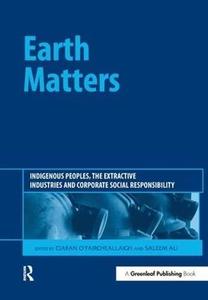
Free Download Earth Matters: Indigenous Peoples, the Extractive Industries and Corporate Social Responsibility By Ciaran O'Faircheallaigh (editor), Saleem Ali (editor)
2008 | 280 Pages | ISBN: 1906093164 | PDF | 4 MB
Indigenous peoples have historically gained little from large-scale resource development on their traditional lands, and have suffered from its negative impacts on their cultures, economies and societies. During recent decades indigenous groups and their allies have fought hard to change this situation: in some cases by opposing development entirely; in many others by seeking a fundamental change in the distribution of benefits and costs from resource exploitation. In doing so they have utilised a range of approaches, including efforts to win greater recognition of indigenous rights in international fora; pressure for passage of national and state or provincial legislation recognising indigenous land rights and protecting indigenous culture; litigation in national and international courts; and direct political action aimed at governments and developers, often in alliance with non-governmental organisations (NGOs).At the same time, and partly in response to these initiatives, many of the corporations that undertake large-scale resource exploitation have sought to address concerns regarding the impact of their activities on indigenous peoples by adopting what are generally referred to as "corporate social responsibility" (CSR) policies. This book focuses on such corporate initiatives. It does not treat them in isolation, recognising that their adoption and impact is contextual, and is related both to the wider social and political framework in which they occur and to the activities and initiatives of indigenous peoples. It does not treat them uncritically, recognising that they may in some cases consist of little more than exercises in public relations. However, neither does it approach them cynically, recognising the possibility that, even if CSR policies and activities reflect hard-headed business decisions, and indeed perhaps particularly if they do so, they can generate significant benefits for indigenous peoples if appropriate accountability mechanisms are in place.In undertaking an in-depth analysis of CSR and indigenous peoples in the extractive industries, the book seeks to answer the following questions. What is the nature and extent of CSR initiatives in the extractive industries and how should they be understood? What motivates companies to pursue CSR policies and activities? How do specific political, social and legal contexts shape corporate behaviour? What is the relationship between indigenous political action and CSR? How and to what extent can corporations be held accountable for their policies and actions? Can CSR help bring about a fundamental change in the distribution of benefits and costs from large-scale resource exploitation and, if so, under what conditions can this occur?Earth Matters gathers key experts from around the world who discuss corporate initiatives in Alaska, Ecuador, Australia, Canada, Peru, Papua New Guinea, Indonesia and Russia. The book explores the great diversity that characterises initiatives and policies under the name of "corporate social responsibility", the highly contingent and contextual nature of corporate responses to indigenous demands, and the complex and evolving nature of indigenous-corporate relations. It also reveals much about the conditions under which CSR can contribute to a redistribution of benefits and costs from large-scale resource development.Earth Matters will be essential reading for those working in and studying the extractive industry worldwide, as well as those readers looking for a state-of-the-art description of how CSR is functioning in perhaps its most difficult setting.
Links are Interchangeable - Single Extraction






